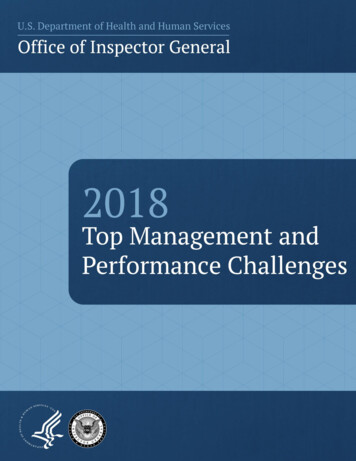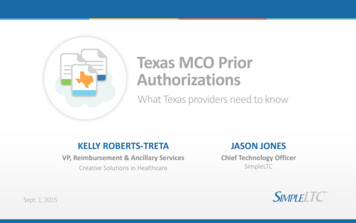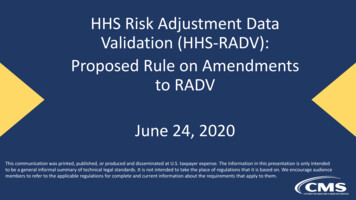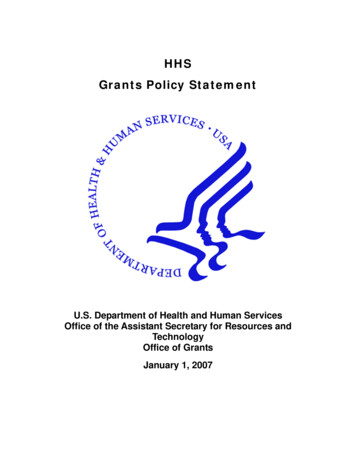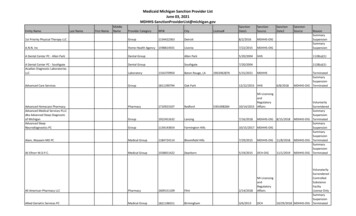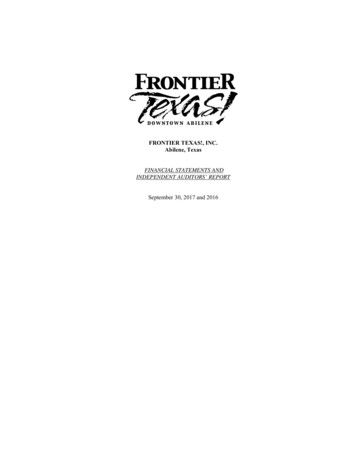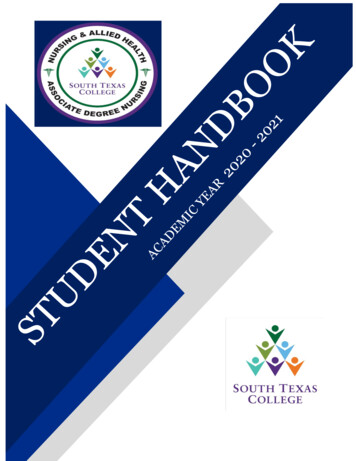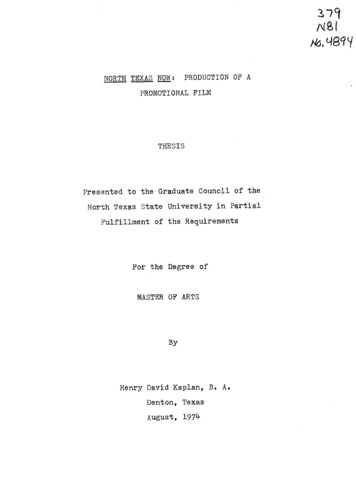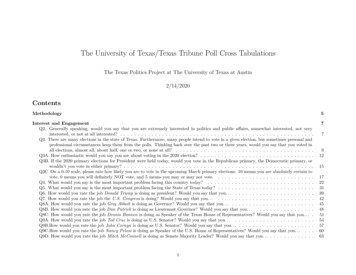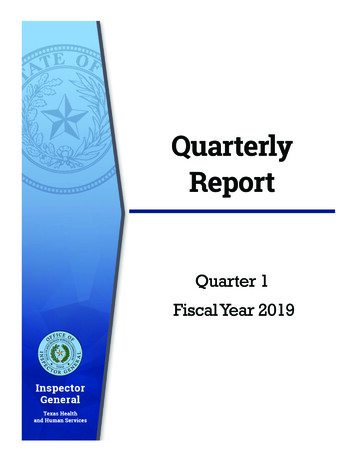
Transcription
QuarterlyReportQuarter 1Fiscal Year 2019
Office of Inspector GeneralTexas Health & Human Services CommissionSylvia Hernandez KauffmanInspector GeneralI am pleased to present the first quarterly report for fiscal year 2019, summarizing the excellent work thisoffice has performed during this period, to Governor Greg Abbott, Executive Commissioner Dr. CourtneyPhillips, the Texas Legislature, and the citizens of Texas.After a strong fiscal year 2018, the first quarter of 2019 continued the trend. Our recoveries totaled nearly 95million; in addition, another 54 million was identified for future recovery, and 42 million was saved in costavoidance.The new fiscal year brings with it some changes to the OIG. Third Party Recovery has been moved backto the OIG from Medicaid and CHIP Services. TPR maintains and helps reduce Medicaid expenditures byshifting claims expense to third party payers utilizing either cost avoidance or cost recovery, and it recovered 76.1 million this quarter.The OIG's mission is to detect, prevent, and deter fraud, waste, and abuse in the delivery of all health andhuman services in Texas. We work to protect the integrity of those health and human services programs,making sure that funds dedicated to providing services to those who need them are spent only for their intendedpurpose. I’m honored to serve with the OIG team as we work to achieve that mission every day.Respectfully,Sylvia Hernandez Kauffman
Quarter 1 resultsDollars recoveredAuditCollections (OIG Audits, UPIC Audits, RAC Audits and OIGcontracted audits) 2,365,859InspectionsWIC collections 81,323Benefits Program IntegrityBeneficiary collections (SNAP, TANF, Medicaid, CHIP, WIC) 4,236,305Voluntary repayments by beneficiaries 63,901Peace OfficersEBT Trafficking team 34,381Medicaid Program IntegrityProvider collections 4,751,724Medical ReviewsAcute care provider collections 1,498,264Hospital collections 4,226,871Hospital collections, AR claims 1,428,277Nursing facility collections 52,102Third Party RecoveryTPR recoveries 76,065,346Cost avoidanceInspectionsVendor disqualifications 4,313,117Benefits Program IntegrityClient disqualifications 1,384,116Medicaid Program IntegrityMedicaid provider exclusions 5,384,910Medical ReviewsPharmacy Lock-InThird Party RecoveryTPR 29,459,323Total cost avoidance 41,826,681 1,285,215How we measure resultsAn investigation, audit, inspection, or review that isperformed, managed, or coordinated by the OIG canresult in:Dollars recovered: Dollars recovered areoverpayments that have been collected based on theTotal dollars recovered 94,804,353 results of an investigation, audit, inspection, or review.Dollars identified for recovery: Dollars identifiedDollars identified for recoveryinclude overpayments identified for recovery duringAuditan OIG investigation, audit, inspection or review for: anProvider overpayments (OIG Audits, UPIC audits, RACalleged violation of a statute, law, regulation, rule, policy,Audits and OIG contracted audits) 26,384,484 or other authority governing the expenditure of fundsInspectionsor the provision of services; a finding that a cost is notDuplicate capitation 2,695,832 supported by adequate documentation; or a finding thatWIC vendor monitoring 12,301 funds were not used for their intended purpose or wereBenefits Program Integrityunnecessary, unreasonably spent, or wasteful.Beneficiary claims in process of recovery (SNAP, TANF,Cost avoidance: Cost avoidance results in resourcesMedicaid, WIC) 10,271,054being used more efficiently; an increase in availablePeace Officersresources from reductions in inefficient expenditures;EBT trafficking 529,079or avoidance of unnecessary expenditure of funds forMedicaid Program Integrityoperational, medical, contract, or grant costs.MCO identified overpayments 10,669,491OIG peace officer recoveriesMedical ReviewsAcute care providers 978,366 Dollars recovered 34,381Hospitals 2,202,114 Dollars identified for recovery 529,079Nursing facility overpayments 164,984 Cases involving OIG peace officers254Total dollars identified for recovery 53,907,705 HB 2523 passed in the 85th Texas Legislature requiresthe OIG to report the portion of funds recovered frominvestigations involving OIG peace officers.1OIG Quarterly Report / Q1 FY 2019
TrendsMedicaid Program IntegrityThe Medicaid Program Integrity (MPI) Division’sprovider field investigations (formerly referred to as fullscale investigations) initiated 77 cases related to 9 providertypes. The largest percentage of the cases involve dentalproviders. MPI uses a data-driven analytic approachdeveloped by the OIG Data and Technology (DAT) unit tofocus on providers whose billing patterns exhibit potentialindicators of solicitation. Of the dental cases that wereopened in this quarter, 11 were opened as a result of DAT'sidentification of providers with high utilization patternson specific services, interesting patterns of new first dentalhome visits, or other potential billing indicators symptomaticof solicitation behavior. Two of the 11 dental providers hadbeen examined during an MPI fraud detection operation.Type of complaints received by MPIPersonal care attendant fraud, waste, or abuseHome health agencyDentalPhysician (individual, clinic, or group practice)Therapy-counselingHospitalAdult day careNursing facilityPharmacyDurable medical equipment52%9%8%6%5%4%3%3%3%2%TrendsMPI has also leveraged DAT's analysis to focus onbehavioral health providers who appear to be billingindividual psychotherapy for group sessions, and anexcessive number of hours of psychotherapy per day,often across multiple managed care organizations (MCOs)and fee-for-service. Ten behavioral health cases have beenopened this quarter based on DAT's analysis.Attendant care: The OIG continues to receive complaintsalleging that attendants are clocking in but not appearing at aclient’s home, and often receives complaints that attendantsand clients are colluding to bill for services not rendered inorder to share the payments. Recent complaints have alsoinvolved allegations against home health agencies for notperforming the mandatory background checks and hiringattendants with criminal history.Provider types under field investigation Dental Physician (individual/group/clinic) Personal care attendants Durable medical Therapy-counselingequipment Home health agency Ambulance Hospital Therapy (physical,occupational, speech)Dental: A common complaint is that clients are solicitedby dental providers, and in those cases, the OIG performsa review of the provider's billing for procedures that arecommonly up-coded or billed but not provided. The OIGalso has received complaints alleging that dental providerswere not credentialed to provide certain services, such asanesthesia, but appeared to have billed for them.Benefits Program IntegrityThe Benefits Program Integrity (BPI) Division opened3,809 investigations involving some form of benefitrecipient overpayment or the intention to commit programfraud. Seventy-five percent of the cases involved unreportedincome (34 percent) or an issue with the reported householdcomposition (41 percent). Household composition casesusually include an unreported household member whohas income, but could also include reporting a householdmember who does not actually live in the household. Bothinstances lead to the household receiving more benefits thanallowed.BPI completed 243 investigations where fraud was2found and referred them for either prosecution (29) or anadministrative disqualification hearing (214).EBT Trafficking UnitThe Electronic Benefits Transfer (EBT) TraffickingUnit identified a trend with local, smaller businesses, mainlyconvenience stores and restaurants, across the state buyingSupplemental Nutrition Assistance Program (SNAP)benefits from recipients. The owners or designees of thoseconvenience stores and restaurants then go to larger retailstores and use the illegally purchased SNAP benefits to buymerchandise in order to stock their businesses. The EBTTrafficking Unit works with loss prevention units of largeretail chains to identify customers who are using multipleSNAP benefits cards to make purchases and is investigatingseveral active cases involving this type of activity.OIG Quarterly Report / Q1 FY 2019
TrendsState Center Investigative TeamThe trends seen by the State Center Investigative Teamand EBT Trafficking Unit in the 201 investigations openedthis quarter include assault, 40 percent; injury to a child,elderly, or disabled person, 42 percent; prohibited activities(including misuse of SNAP EBT cards), 17 percent; andexploitation of child, elderly, or disabled person, 1 percent.Fraud HotlineOf the approximately 7,000 answered calls to the OIGFraud Hotline this quarter, nearly half were allegations offraud related to either SNAP or EBT system issues. Theother half of the calls did not involve the OIG because theissues were unrelated to fraud, waste, or abuse. Many of thecalls sought answers to eligibility issues (i.e. being deniedbenefits or needing to add a beneficiary). The OIG FraudHotline reduced the average hold time for callers to less thanone minute.Case highlightsOIG secures 3.7 million in WIC cost avoidanceA State Office of Administrative Hearings judgeupheld an OIG decision to disqualify a vendor with theWomen, Infants, and Children (WIC) program for threeyears. An OIG invoice audit had identified a patternof unsubstantiated claims totaling 38,397. The judge’sdecision upholds the unsubstantiated claims, which havebeen recovered in full through withholding of subsequentclaims. It also confirms the three-year disqualification ofthe vendor from the WIC program, resulting in 3.7 millionin cost avoidance.OIG joint investigation uncovers a nearly 100,000 Medicaid overpaymentThe OIG was part of a joint investigation with the U.S.Department of State and the Social Security AdministrationOffice of Inspector General of a Medicaid client in El Pasosuspected of using the identity of a deceased person toobtain SNAP, Long-term Care Medicaid, and SupplementalSecurity Income benefits. The months-long investigationuncovered an HHSC LTC Medicaid overpayment of 98,712. The OIG submitted the case with the El PasoCounty district attorney as a theft charge under Chapter 31of the Texas Penal Code.Policy recommendationsAuditThe OIG conducted an audit of Amerigroup Texas,Inc. (Amerigroup) to assess the design and effectivenessof selected security controls over confidential HHSSystem information stored and processed by Amerigroup.Amerigroup is a licensed MCO that contracts with the stateof Texas to provide Medicaid and CHIP services through itsnetwork of providers. As an MCO for Medicaid and CHIPprogram recipients, Amerigroup processes and pays medicalprovider claims, which contain protected health informationand other confidential information. Amerigroup is requiredto protect and secure HHS System information according tocriteria established in the Uniform Managed Care Contract.The OIG examined selected information technologycontrols and related activities at Amerigroup.Audit results indicated that Amerigroup designed andimplemented effective security controls in all evaluatedareas except for the frequency it reviewed access logs toits data center. Amerigroup, consistent with its internalpolicy, conducted quarterly reviews of data center access.HHSC Information Security Controls, however, requires3monthly reviews of access logs. The OIG recommendedthat Medicaid and CHIP Services (MCS) should considertailored contractual remedies to address Amerigroup’s delayin complying with the OIG’s request for information. Inaddition, MCS should require Amerigroup to effectivelyreview physical access logs monthly and update relatedinternal policies according to the HHS Information SecurityStandards and Guidelines.InspectionsThe OIG conducted an inspection to determine if TexasMedicaid processes identify or prevent duplicate capitationpayments to MCOs for clients enrolled in both Medicaidand CHIP. The OIG wanted to establish why clients areenrolled in both CHIP and Medicaid, and if processesmay reduce incidence of duplicate capitation payments toMCOs.Data was examined for the period of June 2015through January 2018; the OIG identified Medicaid andCHIP capitation payments totaling just under 2.7 millionmade for 2,996 Medicaid ID numbers. This amountOIG Quarterly Report / Q1 FY 2019
Policy recommendationsincludes correct and erroneous capitation payments paidfor IDs. The OIG inspection team could not distinguishcapitation payments paid correctly or incorrectly withoutfurther research being performed by eligibility staff inTIERS. The OIG recommended that HHSC MCS, in itscontract oversight role, should require MAXIMUS, aneligibility system, to resolve the issues on processing VOIDtransactions lacking a segment identification for clients. TheOIG also recommended that HHSC prioritize resolvingthe duplicate capitation issues by proactively and regularlymonitoring the Texas Integrated Eligibility Redesign Systemand MAXeb to identify clients enrolled in both Medicaidand CHIP.Rule proposalsNursing facility utilization review criteriaThe OIG recently posted a proposed amendment relatedto nursing facility utilization reviews in the Texas Registerfor formal comment. There were no comments to theproposed amendment which replaces the requirement thatthe OIG conduct onsite utilization reviews of all nursingfacilities every 15 months with a process whereby the OIGconducts a comprehensive annual review of all nursingfacilities. This comprehensive annual review considersfactors such as length of time since the last review, previousreview results, complaints, and referrals in order to prioritizenursing facilities for onsite utilization reviews.The OIG expects the adopted rule to be listed in theTexas Register and become effective in early 2019.The OIG is proposing changes to rules related to HB2379, which passed in 2017 and instituted changes to theMCO recovery process, due to provider overpayments. Theproposed amendments would align the rules with HB 2379and update changes to MCO referral procedures.In fiscal year 2018, the MCOs reported recoveries of 3.89 million. These recoveries will be split between MCOsand OIG per the requirements of HB 2379.Closing investigations amendmentThe OIG recently posted rule amendments and additionsrelated to closing investigations for informal comment.These rules outline the criteria for opening, prioritizing,and closing preliminary, field, and recipient investigations.The amendments and new rule clarify for MCOs and TexasMedicaid providers the criteria OIG uses to close theseHB 2379: MCO referrals and recoveriesinvestigations.The OIG recently posted proposed rule changes relatedThis rule provides greater transparency into the office’sto HB 2379 for informal comment. The OIG receivedinvestigative processes. No comments were received fromcomments from seven stakeholders, prompting somestakeholders during the informal comment period.revisions before the draft rules are presented at the MedicalCare Advisory Committee and HHSC Executive CouncilThe rules will be presented to the Medical Care Advisorymeetings in February 2019. The proposed rules are expected Committee and the HHSC Executive Council in Februaryto be posted in the Texas Register for formal comment in2019 and published in the Texas Register in March.March 2019.4OIG Quarterly Report / Q1 FY 2019
Agency highlightsProvider terminations and exclusionsThe OIG is partnering more closely with MCOs toterminate or exclude providers when required by federal law,such as when a provider has been excluded from Medicare,lost their license, or committed program violations thatwarrant exclusion or termination.Quarter 1 dataAudit reports issued8Audits in progress27Inspections reports issued1MCOs are required to assist by updating their providernetworks regularly with the TMHP provider master file, orby checking the exclusions database on the OIG website(https://oig.hhsc.texas.gov/). MCOs are encouraged tonotify the OIG of providers they have excluded due tofraud, waste, or abuse. These actions help ensure that badactors are removed from networks and payments are notmade to those who should not receive them.Inspections in progress9MPI cases transferred to full-scale investigation79Providers may self-report fraud, waste, orabuseMPI cases referred to Medicaid Fraud Control Unit88More providers are taking advantage of the opportunityto self-audit and self-disclose overpayments during thecourse of an investigation. In the first quarter of fiscal year2019, 24 providers chose to self-disclose. That compares to22 in fiscal year 2017 and 21 in fiscal year 2018.The OIG developed a plan to encourage providers toinvestigate and report matters that involve possible fraud,waste, abuse, or inappropriate payment of funds, whetherintentional or unintentional. The objective was to forma partnership with providers through this self-disclosureapproach, allowing the OIG’s overall efforts to eliminatefraud, waste, and abuse to be enhanced while simultaneouslyoffering providers a mechanism or method to reduce theirlegal and financial exposure.The OIG decides whether to accept the results ofa provider’s self-assessment, but findings based uponprocedures that conform to the OIG Self-DisclosureProtocol will be given substantial weight in determiningappropriate administrative enforcement measures, and theOIG cannot make firm commitments regarding how aparticular disclosure will be resolved. Providers interestedin the OIG Self-Disclosure Protocol may visit the OIGwebsite at https://oig.hhsc.texas.gov/resources.OIG sends warning letters through tipsfrom fraud hotlineThe OIG Fraud Hotline receives about 2,700 calls permonth from callers reporting common types of client fraud,including complaints about sales of Lone Star cards. For the5Investigations completed (BPI, IA, Peace Officer)3,977Investigations opened4,097Medicaid provider investigations completedPreliminaryFull-scaleHospital claims reviewed521616,257Nursing facility reviews conducted60Medicaid and CHIP high-risk provider enrollmentscreenings performed31,191Medicaid providers excluded43Fraud hotline calls answered6,986reports from callers that do not result in an investigation bythe OIG BPI Division, the Fraud Hotline team is sendingwarning letters to program clients and vendors who havebeen reported for certain types of fraud, waste, or abuse todiscourage or prevent this type of activity.Provider enrollment integrity screeningsincrease by nearly 100 percentThe number of provider applicants required to beassessed by the OIG Provider Enrollment IntegrityScreenings (PEIS) team increased by nearly 100 percent thisquarter compared to the first quarter of fiscal year 2018.The increase stems from the revalidation requirementsunder the Affordable Care Act, the automation andadjustment of criteria that causes applications to be routedto the OIG instead of the Texas Medicaid & HealthcarePartnership (TMHP), and the addition of more types ofproviders enrolled directly by program staff, such as theVendor Drug Program, rather than through the TMHP orOIG.The PEIS team completed 21 informal desk reviews ofprovider appeals when denied enrollment, the majority ofOIG Quarterly Report / Q1 FY 2019
Agency highlightswhich were denied because the provider failed to discloseinformation about one of the owners or principals. Twentyof the 21 desk reviews resulted in the provider's enrollmentbeing approved, with 67 percent recommended for approvalof the full allowable enrollment period, and 33 percent for atime-limited enrollment.OIG conducts behavioral health providerfraud detection operationThe OIG conducted a fraud detection operation(FDO) of behavioral health providers, specifically licensedprofessional counselors, in October. Data analytics capturedinformation needed to select three providers from the listof outliers. The OIG investigated providers in El Paso,McAllen, and San Antonio.During the week-long operation, investigators collectedand reviewed records, and conducted provider and clientor guardian interviews. The OIG was able to assembletestimonial and documentary evidence to preliminarilyprove the existence of one or more program violationsby the selected outliers. The previous behavioral healthprovider FDO, which took place in January 2018, resultedin the OIG opening full-scale investigations and referralsto the Office of Attorney General Medicaid Fraud ControlUnit. This was the 16th FDO since August 2016.HHSC and OIG partner on anti-fraud socialmedia campaignThe OIG's BPI Division is coordinating with HHSCAccess and Eligibility Services to launch an anti-fraud socialmedia campaign. The campaign, which will include postersand social media messages, will be aimed at Medicaidproviders and clients to be aware of program fraud and therole the OIG plays in investigating fraud, waste, and abuse.The campaign is scheduled to kick off in February 2019.OIG to implement prepayment reviewsThe OIG will begin asking MCOs to performprepayment reviews for identified providers with a historyof poor performance, including significant inappropriatebilling. Prepayment reviews are a tool to review claimsbefore they are paid to ensure that the provider compliedwith all Medicaid payment rules. Under the TexasAdministrative Code and the Uniform Managed CareContract, the OIG may require the MCOs to perform thisactivity. Providers will be notified of this action, and will alsobe removed from this action if no issues are indicated while6on prepayment review.Lock-in Program updates criteriaThe number of clients in the Texas Medicaid Lock-inProgram has more than doubled since fiscal year 2013, with1,593 clients in the program as of the end of the quarter.The cost savings in fiscal year 2018 totaled nearly 1.9million. These increases are due to managed care referralsand revisions to criteria that better identify recipients withpotentially excessive or conflicting use of the pharmacybenefit. The Lock-in Program restricts a Medicaid clientto one provider and/or pharmacy for health services andprescriptions when the OIG or MCO determines that aclient has abused or misused Medicaid services, includingprescription drugs.The OIG this quarter sent to MCOs updated criteria tothe program, based on feedback from an MCO survey inMay 2018 including: Lowered thresholds for the number of controlledsubstance prescriptions within 90 days from sevento five overlapping or duplicative prescriptions fromtwo or more prescribers. An additional medication added to the list ofdrug combinations with abuse potential to includestimulants such as amphetamines. Instructions added to the 24-month criteria to clarifythat overdose diagnoses should reflect intentionalself-harm or suicide attempt.In fiscal year 2019, the Lock-in Program updated its costavoidance methodology to reflect hospital and emergencycare in addition to pharmacy claims.Lock-in Program average Medicaid recipientsper month and annual cost avoidanceFiscal yearMedicaid recipients*Cost avoidance2014547 115,8412015989 59,88220161,141 158,28420171,052 210,67320181,222 1,881,581Source: OIG Medicaid Lock-in Program staff* Medicaid clients with lock-in status include both fee-for-service andmanaged care recipients for STAR and STAR PLUS.OIG Quarterly Report / Q1 FY 2019
Agency highlightsThe methodology calculates an average cost avoidanceper member per month (see chart on page 6) basedon the cost difference 12 months before and after thelock-in for actual pharmacy claims, emergency care, andhospitalizations.Cost avoidanceThe OIG is working with Texas Medicaid to developstandardized definitions and methodologies for measuringcost avoidance specific to fraud, waste, and abuse in TexasMedicaid. Earlier this year, the OIG released a report atthe request of the Texas Legislature on cost avoidance andwaste prevention activities used by Texas MCOs.The federal government and other states’ reporting onfraud, waste, and abuse cost avoidance, and healthcareindustry research, indicated that there was no consistentdefinition, methodology, or industry standard for calculatingfraud, waste, and abuse cost avoidance in Medicaid andCHIP.After distributing a survey to all Texas Medicaid andCHIP MCOs and dental maintenance organizations(DMOs), and reviewing information in this area, the OIGfound that while Texas MCOs employed prepayment andpost-payment cost avoidance activities, there’s not a uniformdefinition of cost avoidance or a standard methodology tomeasure the effectiveness of cost avoidance activities.RDI team guides managed care transitioneffortsThe OIG Research, Development, and Innovation (RDI)team in the OIG Strategy Office is providing Medicaidmanaged care support to OIG divisions, assisting staff withunderstanding contractual requirements for MCOs, anddeveloping a Managed Care Transition Plan to improveprocesses for the OIG's work in managed care. TheRDI team is supporting ongoing managed care-relatedactivities, training staff and external stakeholders on newprocesses and procedures, and increasing communicationopportunities for feedback to and from MCOs.The Managed Care Transition Plan will capture currentOIG business practices related to auditing, reviewing, orinvestigating fraud, waste, or abuse in managed care, identifyopportunities for business process improvements, andimplement prioritized activities during each state fiscal year.The plan is being developed with input from OIG staff,other HHSC areas, and external stakeholders, includingmedical and provider associations.7Texas Fraud Prevention PartnershipimprovementsThe OIG is working on improvements to the TexasFraud Prevention Partnership (TFPP), including expandingparticipation in the TFPP to all health and dental plansinterested in participating, and by conducting a survey ofTFPP partners to gather feedback towards continuousimprovement efforts.The TFPP is a partnership among participating MCOsand DMOs, HHSC Medicaid and CHIP Services, theOffice of Attorney General Medicaid Fraud Control Unit,and OIG divisions to address fraud, waste, and abuse issuesseen across multiple players.The OIG launched the TFPP initiative several years agowith the goals of: Enhancing communication and coordination withMCO and DMO stakeholders. Helping identify additional potential areas of fraud,waste, or abuse vulnerability in Texas Medicaid andCHIP. More broadly distributing information, analysis,trends, and best practices related to health care fraud,waste, and abuse detection, deterrence, prevention,and investigative efforts. Helping reduce fraud, waste, and abuse in managedcare settings. Strengthening the investigative process. Focusing limited investigative resources on areas withthe highest likelihood of fraud, waste, and abuse.Hospital utilization review team to beginreviews of managed care inpatientadmissionsThe OIG started reviewing managed care inpatientadmissions for hospital utilization reviews (HUR) thisquarter. The HUR team requested a limited number ofmedical records from select providers after coordinatingwith MCOs.Recoupments for hospital utilizationreview providersFollowing the passage of SB 207, 84th Legislature, theOIG temporarily suspended its HUR process in orderto revise diagnosis related group procedures. This delayresulted in some claims being archived without adjustmentOIG Quarterly Report / Q1 FY 2019
Agency highlightsfor overpayments. This quarter, the OIG HUR teamestablished a process with the Medicaid claims administratorto recover previously identified dollars associated withpast overpayments not collected due to the suspension.These are payments made in error that may be deducted,or recouped, from future payments to Medicaid providers.The HUR team is currently reviewing claims from 2016, butthrough this process providers may see recoupments fromreviews conducted as early as 2015.Federal Superior waiver approvedThe OIG received approval from the Centers forMedicare & Medicaid Services for its request for a12-month extension of the Texas Superior Waiver ofinpatient utilization review requirements. The waiversupports the use of Title XVIII utilization reviewprocedures that are superior to those in 42 Code of FederalRegulations (CFR), Part 482, for Title XIX recipients inacute care general hospitals. This waiver includes utilizationreview of admissions by Medicaid clients under the age of21 in freestanding psychiatric facilities paid by the Medicaidprogram.Since January 1989, utilization review of hospitalinpatient claims have been done under waiver authority. TheCenters for Medicare & Medicaid Services authorizes thestate to conduct utilization reviews through this waiver. TheOIG’s Utilization Review Unit conducts initial hospital claimreviews. The unit refers allegations of suspected hospitalfraudulent or abusive billing activity to the OIG’s MPIDivision, which researches the allegations and may pursue acase or refer them to another appropriate entity.Benefits Program Integrity workgrouptackles recoupments and preventionThe BPI Division formed a workgroup to developinitiatives to assist the OIG to recoup and preventimproper payments in Medicaid programs. The projects theworkgroup will undertake in fiscal year 2019 include:8 Continuing with a new Public Assistance ReportingInformation System (PARIS) Match process, whichuses data to assist in maintaining program integrityand detecting improper payments. BPI has oneinvestigator working all PARIS matches. Implementing a new process for working TexasDepartment of Criminal Justice/Prison VerificationSystem matches. Expanding the Federal Tax Information (FTI)Project, which allows the OIG to compare a client’sreported income when applying for benefits to theclient’s federal tax return.Electronic Benefit Transfer Trafficking Unitinvestigates suspicious activityThe OIG completed 36 investigations of EBT casesthis qu
System information stored and processed by Amerigroup. Amerigroup is a licensed MCO that contracts with the state of Texas to provide Medicaid and CHIP services through its network of providers. As an MCO for Medicaid and CHIP program recipients, Amerigroup processes and pays medical pr
